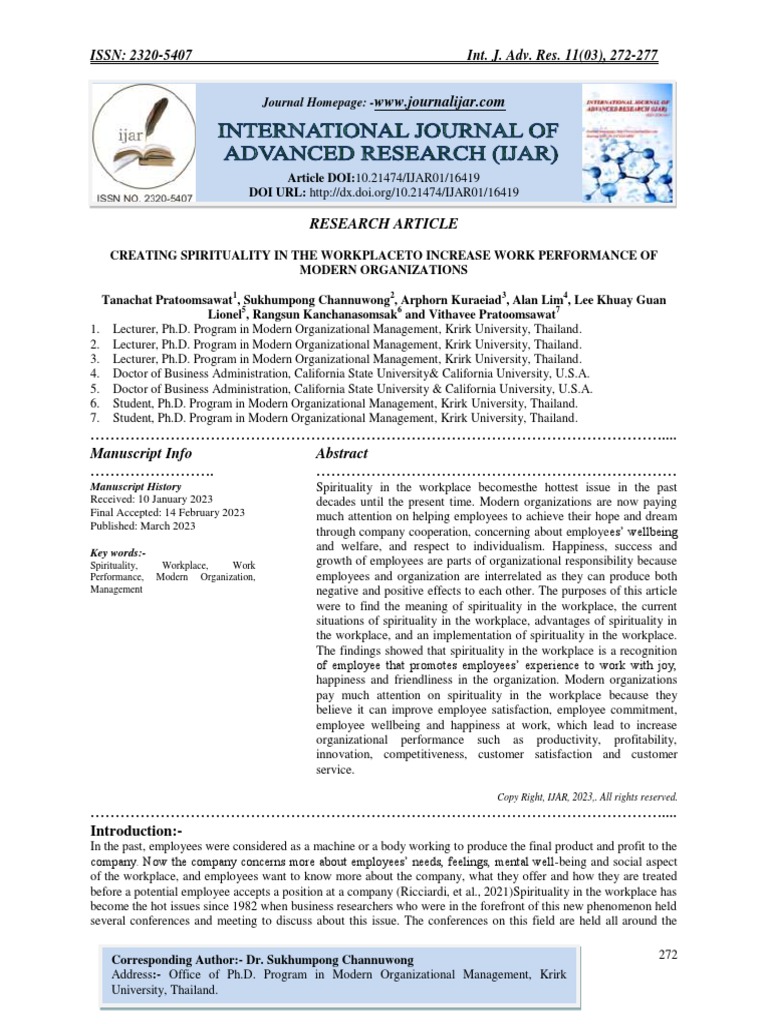In the modern labor landscape, the significance of a spiritually infused workplace cannot be overstated. An environment that harmonizes professional aspirations with spiritual fulfillment has the potential to greatly enhance productivity, morale, and interpersonal dynamics. Drawing from the Bahá’í teachings, this article presents a comprehensive exploration of the principles that contribute to creating such a spiritual workplace, elucidating how these guidelines can serve as a cornerstone for organizational success.
Understanding Spirituality in the Workplace
Spirituality, as elucidated in Bahá’í teachings, encompasses an array of ethical principles, moral values, and universal truths that guide human behavior. At its core, it is about fostering a sense of purpose and interconnectedness among individuals. In the context of a workplace, this translates into a culture where employees not only seek professional advancement but also strive to foster a deeper understanding of their collective identity and contribution to a greater good.
The Principles of Unity and Diversity
According to Bahá’í philosophy, unity in diversity is essential for a thriving work environment. This principle advocates the recognition and celebration of individual differences while simultaneously promoting a cohesive organizational culture. Encouraging diverse perspectives leads to enhanced creativity and innovation. Employers should undertake initiatives that not only recognize but genuinely appreciate the multifaceted backgrounds of their employees. Such an approach cultivates an atmosphere of inclusivity and mutual respect.
Service to Humanity as a Guiding Principle
A spiritual workplace must embody the principle of service to humanity. Bahá’í teachings emphasize that work is an act of worship and, thus, a means to contribute positively to society. Organizations can instill this ethos by aligning their missions with social purposes, encouraging employees to engage in community service, and giving them opportunities to contribute to social impact initiatives. This not only enhances employee satisfaction but also connects their daily tasks with a higher purpose.
Cultivating a Spirit of Collaboration
The Bahá’í faith champions the idea of collaboration over competition. In a spiritual workplace, this manifests as a culture where teamwork and cooperation are prioritized. Organizations can create policies that incentivize collaborative projects and recognize collective achievements. Leaders should model collaborative behavior, demonstrating that success is best achieved through shared efforts. This collaborative spirit can lead to a more harmonious workplace, where employees feel valued and empowered.
Encouraging Spiritual Development
For a workplace to be truly spiritual, it must actively encourage the spiritual development of its employees. This can be achieved through workshops, seminars, and group discussions focused on spiritual principles and their application in daily professional activities. Organizations can also provide resources such as literature, meditation spaces, or mindfulness practices that promote introspection and personal growth. By facilitating an environment conducive to spiritual enrichment, companies not only foster individual growth but also enhance overall organizational well-being.
The Importance of Ethical Leadership
Ethical leadership is paramount in establishing a spiritual workplace, as it sets the tone for the organizational culture. Leaders must embody the Bahá’í principles of justice, fairness, and integrity. They should engage in transparent decision-making processes and ensure that their actions reflect their spoken values. Leadership training programs that focus on the importance of ethical behavior can cultivate a new generation of leaders who are committed to fostering a spiritually uplifting environment.
Creating an Atmosphere of Trust and Respect
Trust and respect are essential components of a spiritually-oriented workplace. Employees must feel safe and respected in sharing their ideas and concerns. This can be cultivated through open communication channels, regular feedback mechanisms, and conflict resolution strategies that emphasize understanding and compassion. When employees feel trusted and respected, it fosters loyalty and a deeper connection to their work and colleagues.
Balancing Work and Personal Life
Achieving a balance between professional responsibilities and personal well-being is vital for creating a spiritually aligned workplace. Employers should implement policies that promote work-life balance, such as flexible work hours, opportunities for remote work, and wellness programs. Recognizing the importance of employees’ lives beyond the office fosters a sense of community and well-being that permeates the workplace culture.
Fostering Continuous Learning and Growth
In the context of Bahá’í teachings, the pursuit of knowledge is seen as an ongoing journey. A spiritual workplace should actively promote continuous learning and personal development. Organizations can establish mentorship programs, skill-building workshops, and educational resources that encourage employees to enhance their competencies. This commitment to lifelong learning not only benefits the individual but also contributes to the organization’s adaptability and resilience in an ever-evolving marketplace.
Conclusion
Creating a spiritual workplace rooted in Bahá’í teachings is not merely an endeavor for organizational betterment; it is a holistic approach that recognizes the profound connection between individual fulfillment and collective success. By embracing principles of unity, service, collaboration, ethical leadership, trust, and continuous growth, organizations can construct an environment where both employees and the organization as a whole thrive. Such a workplace not only elevates performance but also contributes to a more harmonious society, embodying the essence of Bahá’í spirituality. Through intentional practices and a steadfast commitment to these ideals, organizations can transform their workplaces into sanctuaries of spirituality, purpose, and holistic success.
